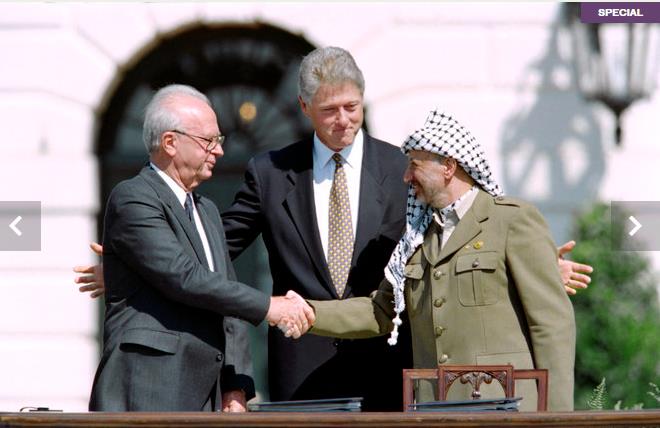
As we approach the 70th anniversary of the Nakba (catastrophe), Palestinians have a choice to make. Do we continue to allow people to dictate our future by blocking every peace effort and demanding all or nothing? Or do we accept a less-than-desirable peace plan in order to become a state? It is not an easy choice, but when you look at Palestinian history, it is a no-brainer. Palestinians must take what they can get and have the confidence to build on it.
In the 1947-48 war, the idea of creating a mini-state in the West Bank, Gaza Strip and East Jerusalem was rejected. Palestinians and Arabs argued that establishing such an entity would be an endorsement of Israel’s creation.
But can you imagine how different things would be if we had accepted the partition? Palestine would have been seated at the UN, and would have had sovereign powers to pursue the rule of law against Israeli transgressions, including the illegal occupation of lands beyond the UN partition plan’s proposed Jewish state.
East Jerusalem, the heart of the city, would today be Palestine’s capital. And East Jerusalem’s holy sites would have become powerful beacons of strength for the Arab, Muslim and Christian worlds. But instead, poor leadership, a lack of vision, and a fear of offending an angry public allowed the unoccupied Palestinian lands to fall under the control of Jordan and Egypt.
Palestinians had another chance in October 1956 when Israel invaded the Sinai Peninsula, followed two days later by the British and French attempt to control the Suez Canal. US President Dwight Eisenhower forced the invaders to withdraw, opening a door to peace for the region. Instead, the Arab world turned to Russia for support. And 11 years later, Israel invaded and occupied the rest of Palestine in a six-day blitz that put the Arab world to shame.
Palestinians must wake up and recognize that a path to statehood is far better than the plan offered by extremists, who urge the rejection of everything.
Ray Hanania
After Israel’s crushing blow in 1967, instead of acknowledging reality, the Arab League issued its infamous “three no’s”: No peace, recognition or negotiations with Israel. Instead of strengthening the Arab cause, this weakened it by portraying the Arab world as extremists. In 1973, Egypt attacked Israel to recover the Sinai, but despite some military gains was quickly routed.
Then the Arab world changed: A new peace movement was born. I was there in October 1993 when Palestinian leader Yasser Arafat and Israeli Prime Minister Yitzhak Rabin shook hands on the White House lawn after agreeing a peace accord that set the stage for a final peace under the concept of the two-state solution.
But extremists in the Palestinian community, backed by the Muslim Brotherhood and its networks in the US and Europe, fought against the peace plan and launched suicide bombings against Israeli civilians, fueling worldwide anger against the Palestinian cause. Meanwhile, an Israeli extremist assassinated Rabin in November 1995.
Arafat met with then-US President Bill Clinton and Rabin’s successor Ehud Barak at Camp David in 2000 to make one last grab for peace. Clinton outlined for Arafat a plan endorsed by Barak that would give Palestinians control of 92 percent of the occupied territories, a significant share of East Jerusalem, and the return of some Palestinian refugees to a Palestinian state. But Arafat refused to accept a compromise on the right of return.
He was clearly more concerned with how his people would react to compromising on that unattainable dream, than on opening the door to Palestinian statehood. So he rejected the peace plan, plunging the Palestinians into renewed Israeli military oppression, and creating the foundation for the fanatics who ran Israel’s government under Ariel Sharon in 2001 and Benjamin Netanyahu from 2009.
Despite pressure to accept a far less generous peace plan offered privately by US President Donald Trump, the Palestinian leadership has publicly refused, fueling a rejectionism that is even worse than after the 1993 peace accords.
Palestinians must wake up and recognize that a path to statehood is far better than the plan offered by extremists, who urge the rejection of everything until Israel miraculously disappears and is replaced by an Arab Palestine. That is not going to happen. If we fail to fight for this peace effort, extremists will forever hold hostage a people that continues to live in uncertainty in refugee camps, and as second-class citizens in a fast-changing world.
Ray Hanania is an award-winning Palestinian-American columnist and the author of several books. His website is www.hanania.com. Twitter: @RayHanania












